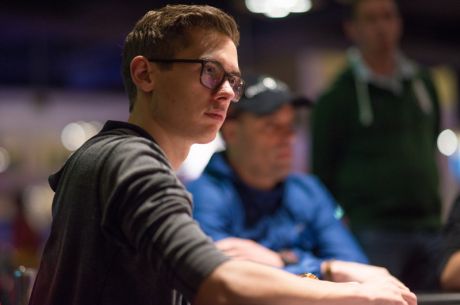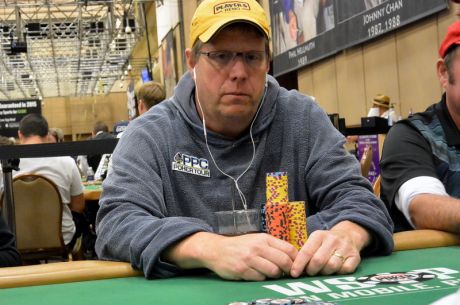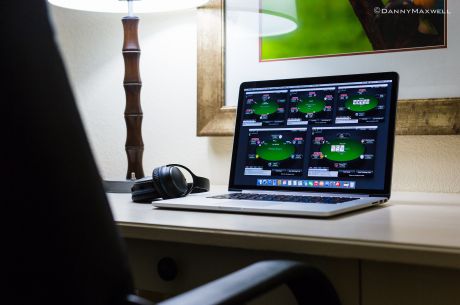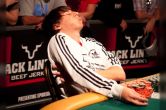Two-Time Sunday Million Winner Rob Tinnion: “More Work Leads to More Money”
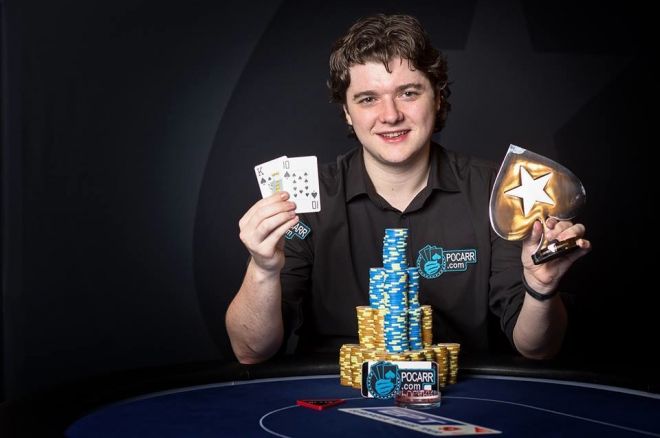
It was August 2014 when the UK’s Rob Tinnion made a name for himself after winning the Sunday Million on PokerStars, topping a field of 7,133 to win a $213,994 first prize — that name being all the easier to recognize thanks to his “robtinnion” username.
A couple of months later Tinnion won a £1,100 No-Limit Hold’em Turbo side event at the European Poker Tour London stop (pictured above), one of several live cashes he has earned over the last couple of years. Then in February of this year, Tinnion joined an exclusive club by winning the Sunday Million for a second time in just six months. Tinnion bested another big field of 6,579 in that one, winning $200,136.
Tinnion currently manages a staking site called Pocarr where he is also a coach. He has figured out a recipe for poker success that anyone can follow, and we caught up with him recently at the World Series of Poker to talk about how he prepares himself for success at the tables, both live and online.
PokerNews: What initially attracted you to poker?
Rob Tinnion: My introduction to poker was from a degenerate gambler point of view. I was just looking to make a quick buck, and I saw poker in the same light as blackjack or roulette or something like that. But eventually I realized that there was a lot more going on than just flipping coins. Once I figured that out, I knew if I joined a training site and put work into it, I could make a lot of money. Once you have that clear formula in your head, it’s pretty easy to work out — more work leads to more money!
How did you first go about getting some training?
I met an American randomly in the UK and we started talking poker. I was a massive fish at the time and he showed me a training site and I signed up and it really opened my eyes. It was the “a-ha” moment of my career. I had a rocky start at first because once I started winning money I didn’t know what to do with it. What really helped me was getting backed by Pocarr — that took a lot of stress away from the game.
Talk about what you did to reach a point where you could win the Sunday Million twice in a six-month span.
When I joined Pocarr [as a backee] I was still at a point where I was almost gambling. I was just clicking buttons. Then I got an email from Alex Carr who owns the group and he said “guys, you need to step up your games and start watching videos and posting in the forums.” As soon as I read that email, I realized I was putting in virtually no effort. I was not acting like a professional by any means. So I put all my effort into watching the videos and posting, and the more I did that, the more I got results. I tried to learn everything they had to give me. I think poker is a game where whoever works the hardest makes the most money.
And now you’re a coach for Pocarr. How has that experience been?
I do about 6 hours a week of coaching for Pocarr, so that keeps me on top of my game as well. I also run Pocarr for 4-5 hours per day, so right now I only play [online] Sundays — but I go into Sundays so fresh that I feel like I have a big edge on the field, and it’s paid off as you know.
Do you think something had to happen to your mental game that allowed you to win two Sunday Millions?
I got coaching with Jon “Apestyles” Van Fleet a few days before my first win, and he told me to do a lot of stuff — things like cut down the number of tables I was playing, for example. The first game that I played after that coaching session was the Sunday Million and I won it, so of course, I think he’s a genius (laughs)! That built my confidence up and I knew I needed to keep following his advice.
I was still somewhat uneasy with my game and [felt a little like] winning the first time was like winning the lottery. I was definitely more focused the second time I won. I knew exactly what I needed to do. I was chip leader for a long time. A lot of players get scared and want to ladder up in that tournament, so you can really put the hammer down and that’s what I did. It was much more satisfying because it showed me the first win wasn’t just a fluke. It gave me a much better sense of zen.
PN: Do you start off tournaments with any sort of plan?
My plan is [mostly about] adjusting. I try to adjust to my tablemates. I also try to play solid and pick my spots well. if you’re playing low stakes, you can play like a bat out of hell because people fold too much. At the higher stakes, there are a lot fewer spots you can take, so they can be more tedious.
What are some of your best tips for up-and-coming players?
The most important thing about the game is that you have to enjoy it. Have fun with it.
When you play, look to take people out of their comfort zone. If you play like everyone else, they’ll know how to deal with you. Take them out of their comfort zone and they’ll start making mistakes. Do things they don’t expect and you’ll increase your ROI.
For me improving my life outside of poker has made me a better poker player. For example, if I have a to-do list, I make sure I have that done before I play, otherwise I might be thinking about it while I’m playing. I want to be super-focused while I play.
Finally, look at what the best players in the game are doing and do that. There is no need to reinvent the wheel.
Thanks to Rob Tinnion for sharing some of his tips for poker success. Visit the Pocarr site for more about Tinnion and the other coaches and to learn what the site offers.
Photo: PokerStars.
Dr. Tricia Cardner is the author of Positive Poker with Jonathan Little, available in paperback, audio, and e-book formats via D&B Poker as well as through the PokerNews Book Section. She also co-hosts The Mindset Advantage Podcast with Elliot Roe, available for free on iTunes, and you can follow her on Twitter @DrTriciaCardner.
Want to stay atop all the latest in the poker world? If so, make sure to get PokerNews updates on your social media outlets. Follow us on Twitter and find us on both Facebook and Google+!

